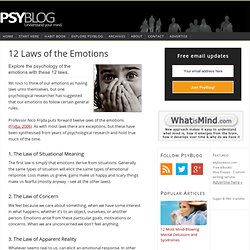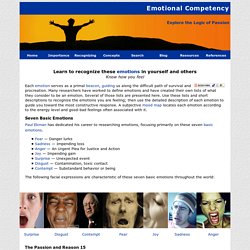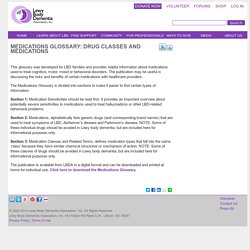

Ag @ tsk. Ἰδιοσυγκρασία. 12 Laws of the Emotions. Explore the psychology of the emotions with these 12 laws.

We tend to think of our emotions as having laws unto themselves, but one psychological researcher has suggested that our emotions do follow certain general rules. Professor Nico Frijda puts forward twelve laws of the emotions (Fridja, 2006). As with most laws there are exceptions, but these have been synthesised from years of psychological research and hold true much of the time. 1. The Law of Situational Meaning The first law is simply that emotions derive from situations.
Are you emotionally intelligent? Here’s how to know for sure. When emotional intelligence (EQ) first appeared to the masses, it served as the missing link in a peculiar finding: people with average IQs outperform those with the highest IQs 70 per cent of the time.

This anomaly threw a massive wrench into the broadly held assumption that IQ was the sole source of success. Decades of research now point to emotional intelligence as being the critical factor that sets star performers apart from the rest of the pack. The connection is so strong that 90 per cent of top performers have high emotional intelligence. The Seven Characteristics of Emotionally Strong People. 18 Behaviors of Emotionally Intelligent People. When emotional intelligence (EQ) first appeared to the masses, it served as the missing link in a peculiar finding: people with average IQs outperform those with the highest IQs 70 percent of the time.

This anomaly threw a massive wrench into the broadly held assumption that IQ was the sole source of success. Decades of research now point to emotional intelligence as being the critical factor that sets star performers apart from the rest of the pack. The connection is so strong that 90 percent of top performers have high emotional intelligence. Emotional intelligence is the "something" in each of us that is a bit intangible. It affects how we manage behavior, navigate social complexities, and make personal decisions to achieve positive results. Understanding Stress: Symptoms, Signs, Causes, and Effects.
What is stress?

The Body’s Stress Response When you perceive a threat, your nervous system responds by releasing a flood of stress hormones, including adrenaline and cortisol. These hormones rouse the body for emergency action. Your heart pounds faster, muscles tighten, blood pressure rises, breath quickens, and your senses become sharper. These physical changes increase your strength and stamina, speed your reaction time, and enhance your focus—preparing you to either fight or flee from the danger at hand. Stress is a normal physical response to events that make you feel threatened or upset your balance in some way. The stress response is the body’s way of protecting you. The stress response also helps you rise to meet challenges. But beyond a certain point, stress stops being helpful and starts causing major damage to your health, your mood, your productivity, your relationships, and your quality of life. Recognize these emotions. The Passion and Reason 15 The book Passion and Reason provides clear definitions and descriptions of 15 separate emotions.

Everyday Stress Can Shut Down the Brain's Chief Command Center. The entrance exam to medical school consists of a five-hour fusillade of hundreds of questions that, even with the best preparation, often leaves the test taker discombobulated and anxious.

For some would-be physicians, the relentless pressure causes their reasoning abilities to slow and even shut down entirely. The experience—known variously as choking, brain freeze, nerves, jitters, folding, blanking out, the yips or a dozen other descriptive terms—is all too familiar to virtually anyone who has flubbed a speech, bumped up against writer’s block or struggled through a lengthy exam. For decades scientists thought they understood what happens in the brain during testing or a battlefront firefight. David Eagleman: The human brain runs on conflict. This article was taken from the May 2011 issue of Wired magazine. Be the first to read Wired's articles in print before they're posted online, and get your hands on loads of additional content by subscribing online. Throughout the 60s, pioneers in artificial intelligence worked late nights trying to build simple robotic programs capable of finding, fetching and stacking small wooden blocks in patterns.
It was one of those apparently simple problems that turn out to be exceptionally difficult, and it led AI scientists to think: perhaps the robot could solve the problem by distributing the work among specialised subagents -- small computer programs that each bite off a piece of the problem. Evidence builds that meditation strengthens the brain. Earlier evidence out of UCLA suggested that meditating for years thickens the brain (in a good way) and strengthens the connections between brain cells.

Now a further report by UCLA researchers suggests yet another benefit. Eileen Luders, an assistant professor at the UCLA Laboratory of Neuro Imaging, and colleagues, have found that long-term meditators have larger amounts of gyrification ("folding" of the cortex, which may allow the brain to process information faster) than people who do not meditate. Employee News « 2012 Indy Info – LRC. Very interesting!!!!

Is it time to act??????? Below is a Science fair project presented by a girl in a secondary school in Sussex. Relive and share your adventures using Stories - Google+ Help. After you create albums in Google Photos, you can share them with other people.

You can allow people to: Just view them Add photos Comment on them You can change the level of access any time. Let people view an album. 9x reviews. Medications Glossary: Drug Classes and Medications. This glossary was developed for LBD families and provides helpful information about medications used to treat cognitive, motor, mood or behavioral disorders.

The publication may be useful in discussing the risks and benefits of certain medications with healthcare providers. Dreaming, waking conscious experience, and the resting brain: report of subjective experience as a tool in the cognitive neurosciences. The APET model: emotions come first, Joe Griffin and Ivan Tyrrell. Joe Griffin and Ivan Tyrrell introduce a biologically-based theory which explains the shortcomings of purely cognitive approaches and why effective therapies can work fast.
DENNY was given a life sentence for murder when he battered his friend to death on a freezing cold night for no reason that he could articulate. Understand the brain function problems that explain mental illness. There are three crucial functions to the human brain and how each part works and relates to each other part can explain how many serious mental problems arise. These parts are Conscious Executing, Unconscious Processing and Flight & Fight.
Conscious Executing Left hemisphere (CE.L) and Right hemisphere (CE.R) This is the pre-frontal cortex which processes imagination and cognition where emotions are under control and so are consciously useful. The prefrontal cortex also holds information not currently in the environment, whose central role is to create the "mental sketch pad". It is the slowest of the three levels of the brain. Each hemisphere of the prefrontal cortex processes differently. Lewy Body Dementia: Information for Patients, Families, and Professionals. Coping with a diagnosis of LBD and all that follows can be challenging. Getting support from family, friends, and professionals is critical to ensuring the best possible quality of life. Creating a safe environment and preparing for the future are important, too. Introduction. At the end of life, each story is different. Death comes suddenly, or a person lingers, gradually failing.
For some older people, the body weakens while the mind stays alert. Others remain physically strong, and cognitive losses take a huge toll. But for everyone, death is inevitable, and each loss is personally felt by those close to the one who has died. End-of-life care is the term used to describe the support and medical care given during the time surrounding death. End of Life: Helping With Comfort and Care. It can be overwhelming to be asked to make health care decisions for someone who is dying and no longer able to make his or her own decisions.
Advance_care_planning_tipsheet_0.pdf. Advance Care Planning. Advance care planning is not just about old age. At any age, a medical crisis could leave someone too ill to make his or her own healthcare decisions. Even if you are not sick now, making healthcare plans for the future is an important step toward making sure you get the medical care you would want, even when doctors and family members are making the decisions for you. More than one out of four older Americans face questions about medical treatment near the end of life but are not capable of making those decisions.
Frontotemporal Disorders: Information for Patients, Families, and Caregivers. In addition to managing the medical and day-to-day care of people with frontotemporal disorders, caregivers can face a host of other challenges. These challenges may include changing family relationships, loss of work, poor health, decisions about long-term care, and end-of-life concerns. Family Issues People with frontotemporal disorders and their families often must cope with changing relationships, especially as symptoms get worse.